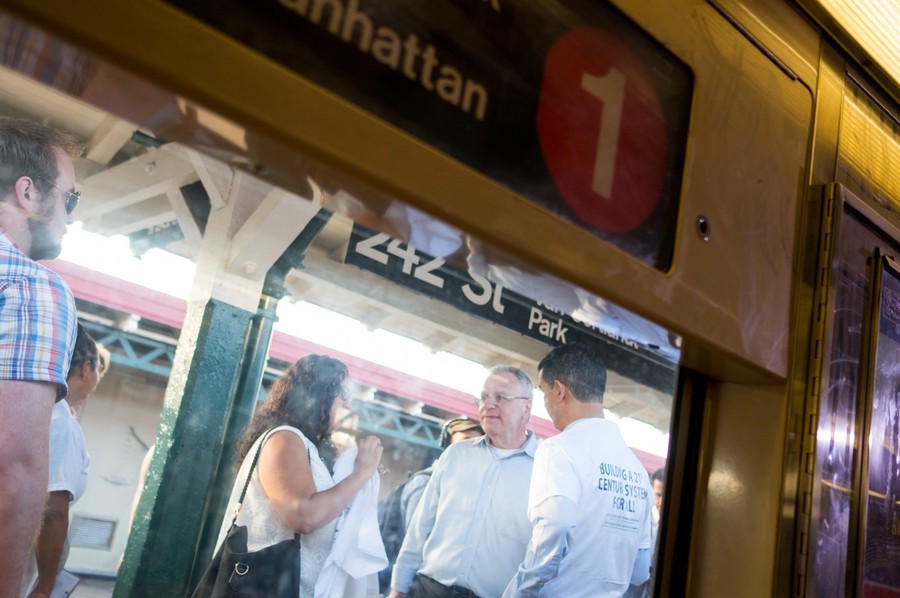Dinowitz says his tax plan could fund MTA fix
The so-called “summer of hell” in New York City mass transit could come to end. That is, if lawmakers can come to a consensus on the best way to fund and fix serious issues with the Metropolitan Transit Authority.
After Gov. Andrew Cuomo declared a state emergency on the subway in late June, a number of elected officials — and even MTA officials — got to work on a plan to relieve commuters of delayed and overcrowded trains.
MTA chair Joe Lhota unveiled his plan to repair the antiquated transit system July 25, including signal repair, track replacement, and even removal of seats on some trains, which he claims would make more standing room — packing in as many straphangers as possible.
All said, the 30-point plan is expected to cost $836 million. And that leaves just one glaring question: Where is that money coming from?
A few of the major players in state and city government have already floated some ideas. Mayor Bill de Blasio wants to push Albany to finally take on his idea of a millionaire’s tax, forcing those who make more than $1 million annually to pay more. It’s a policy the mayor has advocated for years, and has more than once testified in support of it before lawmakers in Albany.
Then there is another old idea: Cuomo resurrected a decade-old plan for congestion pricing at city and state tolls, which would raise toll prices in heavily congested areas of New York, like Fifth Avenue for example, at peak hours in the day.
But they aren’t the only ones with an idea. Assemblyman Jeffrey Dinowitz — who chairs the committee on corporations, authorities and commissions, which oversees the MTA — has proposed a plan to earmark 2 percent of all state income revenues toward transportation needs all across New York State.
“There would be a pot of money that would be proportionally divided, not just to the MTA, but other transportation needs around the state,” the 23-year Assemblyman said of his plan. “It doesn’t leave anyone out. It’s not just for the city, it’s not even just for mass transit.”
The plan, Dinowitz said, would collect enough money to not only help bolster the MTA, but public transportation in places like Albany, and even road infrastructure elsewhere in upstate.
Prioritize transit
“I think this is important because I think it has become clearer and clearer that public transportation, and particularly subways and buses, should be one of our highest priorities,” he said.
But the idea, which could enter the legislative process in January when lawmakers go back to work, is not without its critics. Detractors of Dinowitz’s plan have warned against the prospect of earmarking money in the budget toward transportation for fear that it may take away funding from other major areas.
That’s a legitimate concern, Dinowitz admitted, but added that years of underfunding and overlooking transportation in infrastructure has resulted in a “dire situation” around the state. He even went as far as to say it should be considered as important and as essential a policy item as education and health issues.
“If there’s one thing everybody should have learned during these past several months while this has been on the front page is that our mass transit system ... is top a priority,” Dinowitz said. “This is crucial to millions and millions of New Yorkers who rely on the trains and the buses to get to work every morning.”
And the plan does not necessarily preclude other lawmakers’ ideas for subway funding, Dinowitz said. He said he would love to implement more than one plan to bring money to the MTA.
Bring back tax?
Take de Blasio’s millionaires’ tax, or a reinstitution of the commuter tax — which taxed the income of people who lived outside of New York City but commute in for work. The policy was done away with in 1999, much to Dinowitz’s chagrin, but he said there has been talk of bringing it back.
Restoring the tax could bring in as much as $900 million dollars per year, he said. That idea, however, may have little chance, since the number of legislators representing areas outside the city far exceed those who represent inside the city. It’s very unlikely they would support a tax that affects their constituents, but not people living in New York City.
But the biggest hurdle between getting major fixes for the MTA, Dinowitz said, is ensuring New York’s biggest personalities can work together for a solution. Those two are, of course, de Blasio and Cuomo, whose public feuds over the years have included everything from charter school funding to the death of a beloved deer in Harlem last December.
But Dinowitz says both the mayor and the governor have a great capacity to make good on their legislative promises. He pointed to de Blasio’s success at giving New Yorkers access to Universal Pre-K, and Cuomo’s fight to raise minimum wage to $15 per hour.
“These two guys have shown the ability,” Dinowitz said. “I think both Mayor de Blasio and Gov. Cuomo have shown they can do great things — when they want to.”






